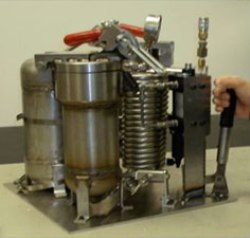May 27 2010
Early production stage hydrogen generation company AlumiFuel Power, Inc. (“API”), the Philadelphia, Pennsylvania-based wholly owned operating subsidiary of AlumiFuel Power Corporation (OTCBB: AFPW), (the “Company”), announced today that its technology was featured in two recent news media articles.
In the online technical reference resource, Knovel Engineering Cases, an article by API’s President & CEO, Mr. David Cade, was featured in the March 12, 2010 issue. Following are excerpts from the article:
 Portable Balloon Inflation System
Portable Balloon Inflation System
“Chemical engineers know better than anyone the difficulties in turning a promising lab curiosity into an actual product. Consider, for example, aluminum-water reactions as a means for generating hydrogen gas. For decades, researchers have been trying to tap the commercial potential of these reactions, which have the potential to produce hydrogen without the high costs and energy inefficiency of steam reforming and electrolysis techniques and systems. Over the years, there have been scores of patents and technical papers documenting efforts to harness the hydrogen-generating power of aluminum-water reactions.
By and large, these efforts have remained in the lab because of the thorny chemistry and engineering development challenges associated with the commercialization and “productization” of the technology. Until now. AlumiFuel Power, Inc., this month introduced a new aluminum-water reactor system called the Portable Balloon Inflation System, or PBIS-1000. Unlike other hydrogen generation technologies, this portable hydrogen generator requires no external energy whatsoever….and can generate 1,000 liters of hydrogen in about 20 minutes; this is enough lift gas to launch a 5-foot-diameter weather balloon.
AlumiFuel’s engineers also made the hydrogen generation system modular, scalable, and flexible, in keeping with the diverse group of applications that the technology targets. AlumiFuel engineers also are working on other form factors, including some that do not make use of the current reactor hardware. UUV power plants using turbines, thermoelectric converters, and/or fuel cells are one example…..a common thread runs through all these applications: Tailor the reaction chemistry to the job at hand and find clever ways to package that chemistry for the user.”
In the other feature, API’s Director of Engineering, Mr. Sean McIntosh, was cited in an article in the May 2010 Fuel Cell Bulletin: “Now, voyager? The increasing marine use of fuel cells”, by Vicki P. McConnell. An excerpt from the article follows: “Early-stage production company, AlumiFuel Power, Inc. (Philadelphia, Pennsylvania) is designing a hydrogen generator for UUVs that reacts aluminum, water and proprietary additives to create H2. The company is also developing a steam generator, and hopes to integrate both technologies ‘to increase energy density even more,’ says engineering director Sean McIntosh. Such a hybrid system has the potential to beat the energy density values of lithium batteries fivefold. ‘Each generator would be activated at different times, depending on mission requirements and profile,’ McIntosh explains.”
This maritime applications initiative is directly related to the recent selection of API’s hydrogen generation technology for award of a U.S. Navy R&D contract as a novel new hydrogen source for powering future Unmanned Undersea Vehicles (UUVs).